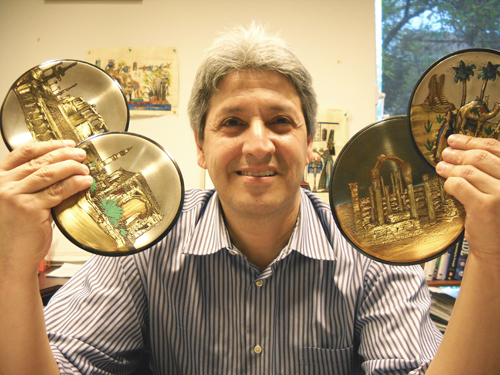
When the hand gripped his shoulder, Shawki Areibi remembered his instructions. He and the other engineering students at Libya’s Al Fateh University had been warned about that day’s visitor: If he approaches or touches you, don’t move left or right, just stay still.
Standing in a lab with his back to the door, Areibi knew that the visiting entourage had entered the room. When he felt the hand on his shoulder, he froze.
It was only for a moment. Thirty years later, the U of G engineering professor doesn’t remember whether Libyan leader Muammar Gaddafi said anything to him or not. “I couldn’t move.”
This September – months after the country’s revolution began – most of Libya had been taken by rebel fighters backed by a NATO mission that includes Canadian forces. Early this week, Gaddafi’s forces were still resisting in his hometown of Sirte, and the leader himself was still free.
But with relative security in place in Tripoli, Areibi was preparing to return to his hometown. Mid-week, he was still awaiting news of whether he might fly into the newly reopened Tripoli airport or into Tunisia.
When he finally arrives in Libya, Areibi will spend up to six weeks of his sabbatical working with engineering administrators at universities in Tripoli and Benghazi. Besides leading several short courses and seminars, he plans to help both campuses reorganize their curriculum and provide textbooks and other teaching materials. About 8,000 engineering students are enrolled on both campuses.
He will also begin long-term discussions about graduate engineering programs and accreditation. Once back in Canada, Areibi will continue that work with native Libyan colleagues at engineering schools in Waterloo, London and Edmonton.
The computer engineer had already planned to visit colleagues in Tripoli during his sabbatical. “They wanted me to come, and then the revolution happened Feb. 16, and everything changed.”
Founded as Tripoli University, the institution had been renamed as Al Fateh University under Gaddafi. Its original name was restored after the regime’s downfall this year.
Areibi completed his undergrad there in 1984. “They had an excellent higher education system there during my undergrad.”
Immigrating to Canada two years later, he completed graduate degrees in computer engineering at the University of Waterloo. He joined Guelph in 1999.
This fall, he will stay with his family in Tripoli. It will be his second visit to North Africa this year. When his mother, brother and several sisters fled the city and the country’s conflict in June, Areibi travelled to Tunisia to meet them. He spent nerve-racking hours waiting in a rented car at the border. It was not until the next day that his mother, Ghalia, arrived in an ambulance (she has Alzheimer’s disease). His brother, Osama, followed with his family a week later. Shawki learned then that they had been detained by soldiers in Libya, even threatened with jail before being released.
After the rebels took Tripoli this summer, the family returned to the capital. The Guelph professor says things are more stable there now.
Growing up in the capital, Areibi had learned early to despise the regime. He saw close friends hanged one day. “We were forced to watch; it was terrible. They hadn’t done anything. They spoke out: ‘There are things happening in Libya that we do not agree upon.’”
He had also learned to keep his feelings to himself. “I was very careful from day one. My father gave us directions. Do not get involved in politics.”
Areibi’s family had already fled Libya once, after American air strikes began in 1986 in response to the Libyan bombing of a German discotheque. That year, the family came all the way to Canada to settle. Most returned to Africa in 1994; Shawki remained here with his wife, Souad Esadeg, a doctor trained in Libya. They have four sons.
Areibi knows that Libya is still a country at war, but he feels compelled to go to help his alma mater and his family. He says he also feels drawn to visit Martyrs’ Square and Gaddafi’s military barracks in the city, long off-limits to visitors. “This place was a mystery for all of us for 42 years.”